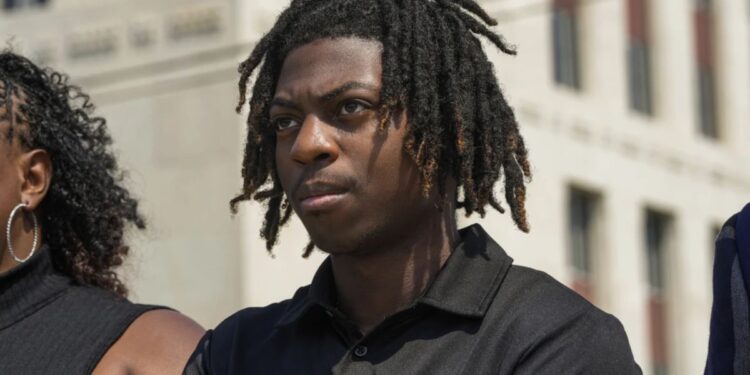A black high school student in Texas has left his school district rather than risk another year of in-school suspension due to his hairstyle, According to his attorney.
Darryl George, 18, wants to return to his Houston-area high school in the Barbers Hill school system for his final year and has requested a federal judge to give a temporary restraining order to prevent school officials from disciplining him further for not shaving his hair. It would allow him to return to school while a federal lawsuit he filed is pending.
George’s motion comes after U.S. District Judge Jeffrey Brown dismissed the majority of the claims filed by the youngster and his mother in a federal lawsuit alleging that school district officials discriminated against him based on race and gender.
The judge only upheld the gender discrimination allegation and questioned whether the school district’s hair length limit is more harmful than beneficial.
George said in an affidavit last month, “Judge Brown, please help us so that I can attend school like a normal teenage student during the pendency of this litigation.”
Brown has scheduled a court hearing in Galveston for October 3, according to George’s request.
In court documents filed last week, attorneys for the school system stated that the judge lacks jurisdiction to impose the restraining order since George is no longer a student in the district.
According to the school district’s lawyers, “George’s withdrawal from the district does not deprive him of standing to seek past damages, although the district maintains that George has not suffered a constitutional injury and is not entitled to recover damages.”
The district argues that the purpose of its dress code restrictions for students is to “teach grooming and hygiene, instill discipline, prevent disruption, avoid safety hazards, and teach respect for authority.”
Allie Booker, one of George’s attorneys, stated in court documents filed last week that Barbers Hill officials placed the student on in-school suspension on the first and second days of the new school year, which began last month, forcing him to “unenroll” from Barbers Hill High School in Mont Belvieu and transfer to another high school in a different Houston area district.
“This caused him significant emotional distress, eventually leading to a nervous breakdown.” As a result, we had no choice except to remove him from the school,” Booker explained.
George’s departure was “not a matter of choice, but of survival,” but he wants to return because his mother came to the area because of the district’s academic quality, according to Booker.
The school district barred George from his regular high school classes for most of the 2023-24 academic year, when he was a junior, citing his hair length as a violation of its dress code. The school district required George to either serve an in-school suspension or participate in an off-site disciplinary program.
The district has claimed that George’s long hair, which he wears to school in tied and twisted locs on top of his head, violates its rules because if let down, it would fall below his shirt collar, brows, or earlobes. Other pupils with locs comply with the length policy, according to the district.
George’s federal lawsuit also claimed that his punishment violated the CROWN Act, a recent state statute that prohibits racial discrimination in hair. Prior to the hair issue, the CROWN Act, which came into effect in September 2023, forbade employers and schools from penalizing individuals for their hair texture or protective hairstyles like Afros, braids, locs, twists, or Bantu knots.
In February, a state judge concluded in the school district’s case that the punishment does not violate the CROWN Act.
Two more pupils challenged Barbers Hill’s hair regulation in a May 2020 federal lawsuit. Both students left the high school, but one returned after a federal judge granted a temporary injunction, citing “a substantial likelihood” of violating his rights to free speech and freedom from racial discrimination if expelled. The litigation is still pending.


